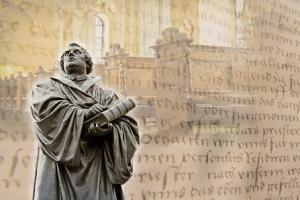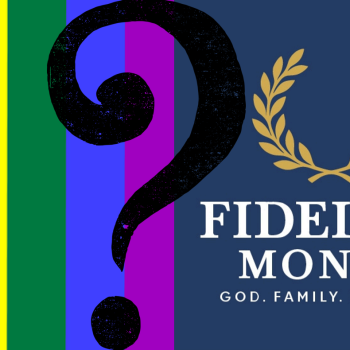 Did the Church fall in its infancy? According to German Reformer Martin Luther, it did.
Did the Church fall in its infancy? According to German Reformer Martin Luther, it did.
In this article, I will evaluate the claim by Martin Luther that the Church stands or collapses on the understanding of faith alone as forensic justification (FAFJ).
This article will NOT demonstrate a developed Tridentine understanding of justification existed in the early Church. There existed no such understanding. A fully developed understanding of justification, like the Trinity, took time.
Furthermore, the Catholic Church nowhere states that an understanding in part constitutes the collapse of the whole. Luther makes the claim and therefore that claim we must examine. Did the Church fall?
How Did the Church Fall?
Martin Luther summed up the fulcrum by which all of Christianity stands or falls when he stated:
“quia isto articulo stante stat Ecclesia, ruente ruit Ecclesia— “Because if this article [of justification] stands, the church stands; if this article collapses, the church collapses.” (Mart WA 40/3.352.3)
The article Luther refers to is justification by faith alone or forensic justification (FAFJ).
“When we talk about justification being forensic, we mean that, in the final analysis, God justifies us when He pronounces that in His sight we are considered, deemed, or regarded as just. Forensic justification involves God’s declaration of a person being just in His sight. It is a legal declaration by which God declares a person just.” – RC Sproul
Luther’s Logical Fall
If we follow Luther’s logic and cannot show that the Church has always taught FAFJ, then we must conclude that the Church did indeed fall. Nor does Luther give us other options. He does not allow for the development of this doctrine. He does not allow FAFJ to exist in some sort of proto form at an earlier time to then develop into Luther’s full form in the 16th century. No, he states quite clearly that if this article collapses, the whole Church collapses with it. Juxtapose this with Jesus’ words in Matthew 16:18 and we see that the Church and Martin Luther have a problem.
A careful evaluation of historical Christian thought and practices shows FAFJ a theological innovation of Martin Luther in the 16th century. It was an innovation in response to the Catholic Church’s abuse of indulgences. FAFJ was unknown to early Christian writers. Conversely, if early Christian writers had a concept of FAFJ, the means by which they dealt with grave sin after baptism, especially fornication, adultery, apostasy, and sacrilege, would have been different. The way in which early Christians discussed, argued, and ultimately resolved the issue of grave sin after baptism shows a total lack of understanding of FAFJ.
Faith Alone Thought Early Church?
It is true that some early Christian writers did placed the words “faith” and “alone” together in their writings. For example:
Novatian, 200-258 AD
“God rejoices in our faith alone, in our innocence alone, in our truth alone, in our virtues alone. And these dwell not in our belly, but in our soul; and these are acquired for us by divine awe and heavenly fear, and not by earthly food.” (Novatian, On the Jewish Meats, Chapter V,)
Aristides, 2nd Century AD
“Now by the grace of God it was given me to speak wisely concerning Him. So far as I have received the faculty I will speak, yet not according to the measure of the inscrutability of His greatness shall I be able to do so, but by faith alone do I glorify and adore Him.” (The Apology of Aristides, Introduction)
Chrysostom 347-407 AD
Again, they said that he who adhered to Faith alone was cursed, but he shows that he who adhered to Faith alone, is blessed. (Chrysostom, Homilies on the First Epistle of St. Paul to Timothy, Homily IV, on 1 Tim. 1:15,)
Theodoret, 393-458 AD
“Through faith alone I look for finding some mercy in the day of the Lord’s appearing. I wish and I pray that I may follow the footprints of the holy Fathers, and I earnestly desire to keep undefiled the evangelic teaching which was in sum delivered to us by the holy Fathers assembled in council at the Bithynian Nicæa.” (Of Theodoretus, Bishop of Cyrus, to Dioscorus, Archbishop of Alexandria)
Faith Alone Properly Defined
At this point, any honest theologian or historian should ask the obvious question: did the writers just quoted understand faith alone to mean FAFJ as espoused by Martin Luther? Short answer, no, they did not. When an early Church writer placed the words “faith” and “alone” together does not mean they had Luther’s understanding of FAFJ in mind. A careful analysis of their overall writings shows this is indeed the case. In fact, the early Church did not have a clear and concise understanding of justification, but it is clear they DID NOT have in mind Luther’s innovation of FAFJ.
Exegeting Faith Alone the Church Stands
The only instance faith alone appears in scripture precedes the word “not.”
You see that a person is justified by works and not by faith alone. – James 2:24.
Those who adhere to FAFJ go to great lengths to demonstrate that the “not” before “faith alone” does not mean “not” as the plain reading of the text would suggest. “No,” they say. They then proceed to perform various exegetical gymnastics to show that James is using a different kind of faith than Paul uses in Romans and Galatians (Galatians 2:15–16 and Romans 4:2). They then conclude that, since James and Paul use “faith” in different ways, we cannot use James 2:24 to refute FAFJ. The obvious reading is off the table.
Furthermore, if this principle of exegesis, used by adherence of FAFJ for the only scripture where faith alone appear together, then this same interpretive principle also applies to the writings of early Church that use the words faith alone. All examples of faith alone in any early Church writing are now off the table.
No early Christian taught FAFJ as understood by Martin Luther. The early Church is silent on FAFJ. The way it addressed issues of sin also demonstrate this reality (I deal with this topic here). Therefore, the only logical (and historical/theological) conclusion to reach is that the Church did not fall—just as Christ promised.
Like what you read? Please check out my other writing here.
Please like and follow me on Facebook.












